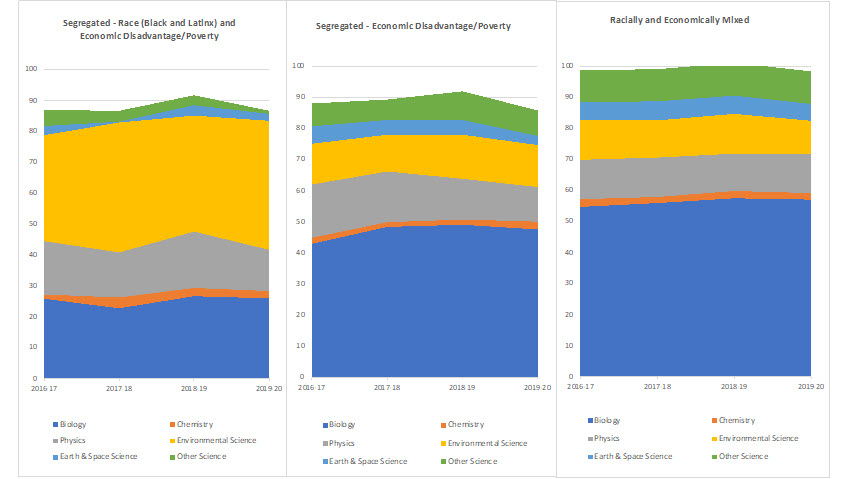By Vandeen Campbell
Freshman Year Science Course-taking in NJ, 2016-2019
Note: The total number of schools and students represented in each chart panel varied slightly each year. In 2019-20, 58 high schools (total 9th grade enrollment: 13,797) were segregated by both race and poverty. 41 high schools were segregated by poverty only (9th grade enrollment: 11,716). 265 high schools (9th grade enrollment: 66,586) were racially and socioeconomically mixed. Each year represents a different freshman class.
New Jersey students in high schools segregated by both race and poverty tend not to take advanced science courses. Only about one-quarter (25%) of high school freshmen in schools segregated by both race (90%+ students of color) and poverty (50%+ economic disadvantage) take Biology, compared with nearly six in ten freshmen in mixed schools (57%). This is important because students who take higher level science courses (i.e., Chemistry and Physics) tend to do better on postsecondary success indicators (e.g., immediate college enrollment) and are more likely to enter careers in science, technology, engineering, and mathematics (STEM). In NJ, very different patterns in science course-taking emerge as early as freshmen year – based on schools’ racial and socioeconomic composition.
With support from the New Jersey State Policy Lab, the Joseph C. Cornwall Center for Metropolitan Studies is releasing a report that examines patterns in high school science course-taking across New Jersey. Considering that high school science courses are not equivalently leveled, this study takes a closer look at trends in enrollment in traditional science courses such as Environmental Science, Biology, Chemistry and Physics. National disparities in access to higher-level science courses and disproportionate participation of Black and Hispanic individuals in STEM occupations underscore the importance of continuously monitoring equity in access. One way to do this is to track secondary school science course enrollments, a key pathway to STEM careers.
Importantly, some segregated schools (e.g., Dover High School in Morris County) register levels of standard to advanced science course enrollments, comparable to mixed enrollment schools. The practices and policies in these positive outlier schools could be informative to other schools from similar backgrounds. The report discusses a number of policy and practice strategies which could be considered to improve access to advanced science courses.

